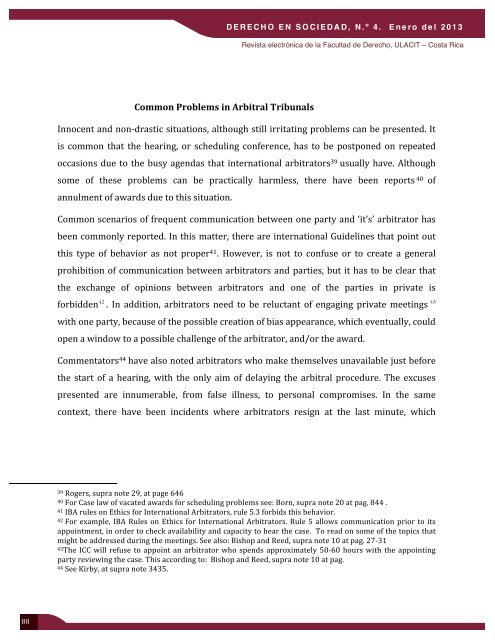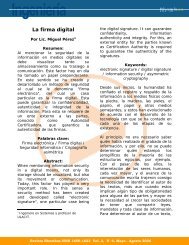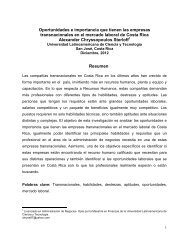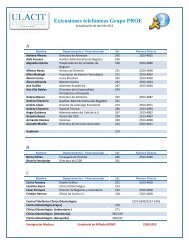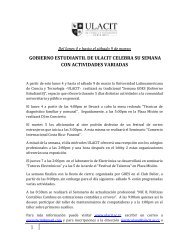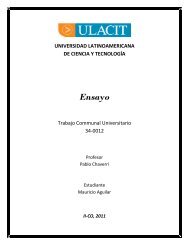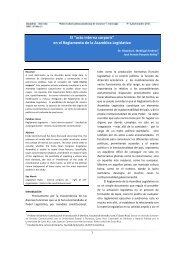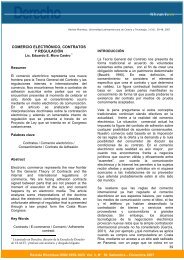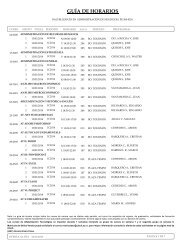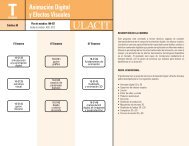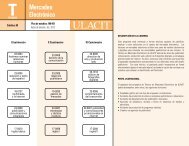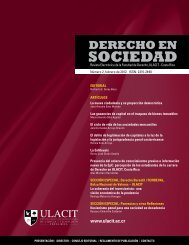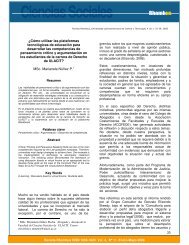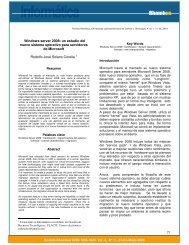IV Edición Revista Derecho en Sociedad - Ulacit
IV Edición Revista Derecho en Sociedad - Ulacit
IV Edición Revista Derecho en Sociedad - Ulacit
You also want an ePaper? Increase the reach of your titles
YUMPU automatically turns print PDFs into web optimized ePapers that Google loves.
DERECHO EN SOCIEDAD, N. º 4 . Enero del 2013<br />
<strong>Revista</strong> electrónica de la Facultad de <strong>Derecho</strong>, ULACIT – Costa Rica<br />
Common Problems in Arbitral Tribunals <br />
Innoc<strong>en</strong>t and non-‐drastic situations, although still irritating problems can be pres<strong>en</strong>ted. It <br />
is common that the hearing, or scheduling confer<strong>en</strong>ce, has to be postponed on repeated <br />
occasions due to the busy ag<strong>en</strong>das that international arbitrators 39 usually have. Although <br />
some of these problems can be practically harmless, there have be<strong>en</strong> reports 40 of <br />
annulm<strong>en</strong>t of awards due to this situation. <br />
Common sc<strong>en</strong>arios of frequ<strong>en</strong>t communication betwe<strong>en</strong> one party and ‘it’s’ arbitrator has <br />
be<strong>en</strong> commonly reported. In this matter, there are international Guidelines that point out <br />
this type of behavior as not proper 41 . However, is not to confuse or to create a g<strong>en</strong>eral <br />
prohibition of communication betwe<strong>en</strong> arbitrators and parties, but it has to be clear that <br />
the exchange of opinions betwe<strong>en</strong> arbitrators and one of the parties in private is <br />
forbidd<strong>en</strong> 42 . In addition, arbitrators need to be reluctant of <strong>en</strong>gaging private meetings 43<br />
with one party, because of the possible creation of bias appearance, which ev<strong>en</strong>tually, could <br />
op<strong>en</strong> a window to a possible chall<strong>en</strong>ge of the arbitrator, and/or the award. <br />
Comm<strong>en</strong>tators 44 have also noted arbitrators who make themselves unavailable just before <br />
the start of a hearing, with the only aim of delaying the arbitral procedure. The excuses <br />
pres<strong>en</strong>ted are innumerable, from false illness, to personal compromises. In the same <br />
context, there have be<strong>en</strong> incid<strong>en</strong>ts where arbitrators resign at the last minute, which <br />
39 Rogers, supra note 29, at page 646 <br />
40 For Case law of vacated awards for scheduling problems see: Born, supra note 20 at pag. 844 . <br />
41 IBA rules on Ethics for International Arbitrators, rule 5.3 forbids this behavior. <br />
42 For example, IBA Rules on Ethics for International Arbitrators. Rule 5 allows communication prior to its <br />
appointm<strong>en</strong>t, in order to check availability and capacity to hear the case. To read on some of the topics that <br />
might be addressed during the meetings. See also: Bishop and Reed, supra note 10 at pag. 27-‐31 <br />
43The ICC will refuse to appoint an arbitrator who sp<strong>en</strong>ds approximately 50-‐60 hours with the appointing <br />
party reviewing the case. This according to: Bishop and Reed, supra note 10 at pag. <br />
44 See Kirby, at supra note 3435. <br />
88


